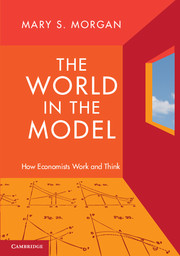Book contents
- Frontmatter
- Contents
- Figures, Tables, and Boxes
- Preface
- 1 Modelling as a Method of Enquiry
- 2 Model-Making: New Recipes, Ingredients, and Integration
- 3 Imagining and Imaging: Creating a New Model World
- 4 Character Making: Ideal Types, Idealization, and the Art of Caricature
- 5 Metaphors and Analogies: Choosing the World of the Model
- 6 Questions and Stories: Capturing the Heart of Matters
- 7 Model Experiments?
- 8 Simulation: Bringing a Microscope into Economics
- 9 Model Situations, Typical Cases, and Exemplary Narratives
- 10 From the World in the Model to the Model in the World
- Index
- Plate Section
- References
10 - From the World in the Model to the Model in the World
Published online by Cambridge University Press: 05 November 2012
- Frontmatter
- Contents
- Figures, Tables, and Boxes
- Preface
- 1 Modelling as a Method of Enquiry
- 2 Model-Making: New Recipes, Ingredients, and Integration
- 3 Imagining and Imaging: Creating a New Model World
- 4 Character Making: Ideal Types, Idealization, and the Art of Caricature
- 5 Metaphors and Analogies: Choosing the World of the Model
- 6 Questions and Stories: Capturing the Heart of Matters
- 7 Model Experiments?
- 8 Simulation: Bringing a Microscope into Economics
- 9 Model Situations, Typical Cases, and Exemplary Narratives
- 10 From the World in the Model to the Model in the World
- Index
- Plate Section
- References
Summary
Introduction
Models and modelling have changed the science of economics, the way that economic knowledge is used in the world, and the way that economists see and understand the world.
If we look back two centuries again, as we did at the start of Chapter 1, we now have a much better view of the way in which economics has changed. Adam Smith’s Wealth of Nations of 1776 covered the whole territory of what then constituted the art and science of political economy in an expansive verbal treatment. His text provided a closely sequenced set of arguments linking the laws of political economy together, and simultaneously illustrating and supporting those laws by the evidence of common experience and of history. Modern economics is qualitatively very different. It has became a social science largely dependent on small mathematical or diagrammatic models, each separately representing different bits of the economy and each treated largely independently of the others, while its evidence base rests largely on statistical, and now experimental, methods. So the changes in economics might be found both in these new objects: models, as a way of expressing economic ideas and content, and in the new way of reasoning with them: modelling.
- Type
- Chapter
- Information
- The World in the ModelHow Economists Work and Think, pp. 378 - 412Publisher: Cambridge University PressPrint publication year: 2012



